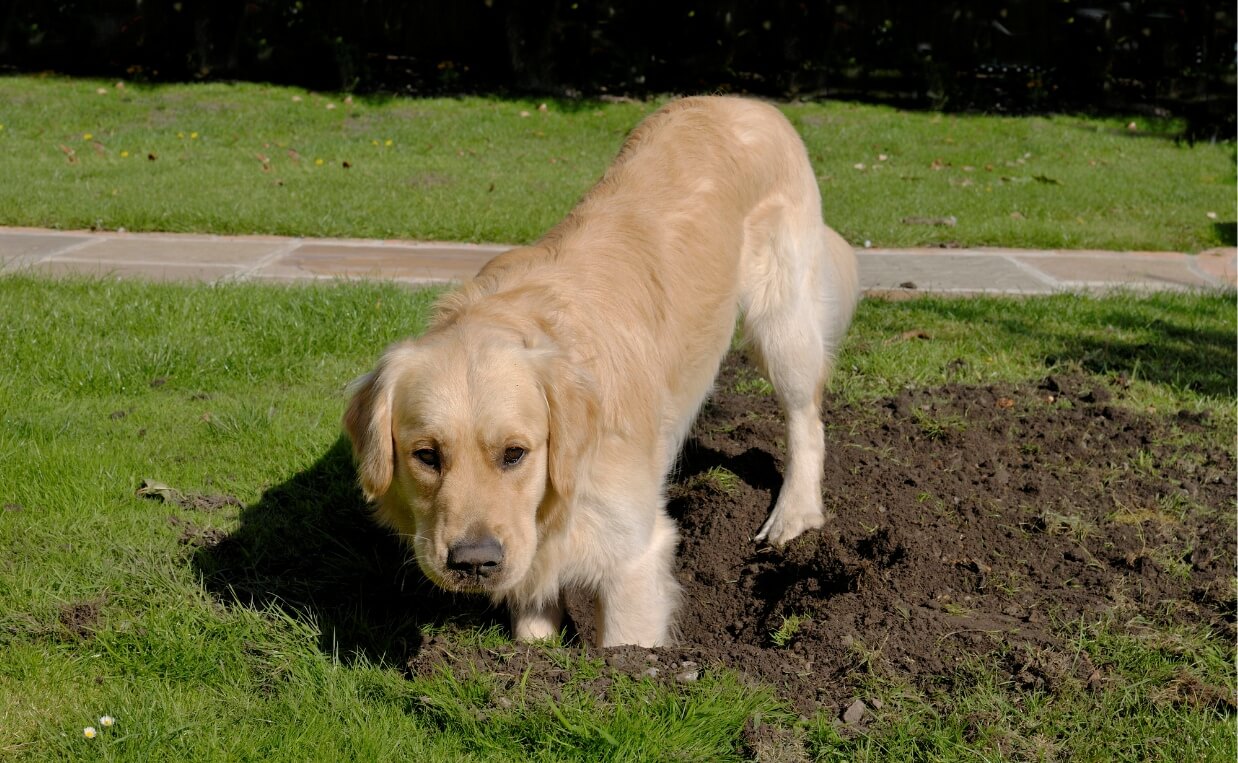
Digging is a normal behavior in dogs. However, a dog who digs can be a real nuisance, especially if he or she is digging into your neighbor’s backyard or worse, digging a hole large enough to escape your yard and run into the street.
It might seem like a losing battle trying to stop your dog from digging under the fence or digging big holes in the yard, but there are plenty of solutions to fix the problem.
Why Does Your Dog Dig?
Before you determine the best way to approach your dog’s digging behavior, you need to identify why he or she digs. Here are ten common reasons:
-
Your dog is a “Houdini hound”
A Houdini hound is a dog who is especially prone to digging and escaping. Many of these dogs were bred for digging. Here are some breeds commonly classified as “Houdini hounds”.
- Dachshund
- Malamute
- Siberian Husky
- Jack Russell
- Basset Hound
- Bloodhound
- Beagle
- Chow Chow

-
Your dog is hiding a bone
Sometimes dogs save their food for later. They dig a hole and bury bones in it. This behavior is based on hereditary behavior when wild dogs would bury their food so they could eat it later.
-
Your dog smells bone meal
Dogs have an amazing sense of smell. If you have used bone and/or blood meal in your garden (great for garlic) your dog may be digging to find that food (which doesn’t exist).
-
Your dog is bored
Boredom is one of the most common reasons dogs dig. Breeds who are known to be highly intelligent, like border collies, poodles and German shepherds, are especially prone to being bored. Dogs who are left alone for long periods of time or who are not receiving enough enrichment are likely to try to find ways to satisfy their boredom.
-
Your dog is trying to chase a squirrel
Some dogs have a stronger prey drive than others. They are particularly drawn to something beyond the fence they perceive as prey, such as a squirrel, cat, rabbit or other small animal. This trait is more prominent in scent hounds as well as terriers.
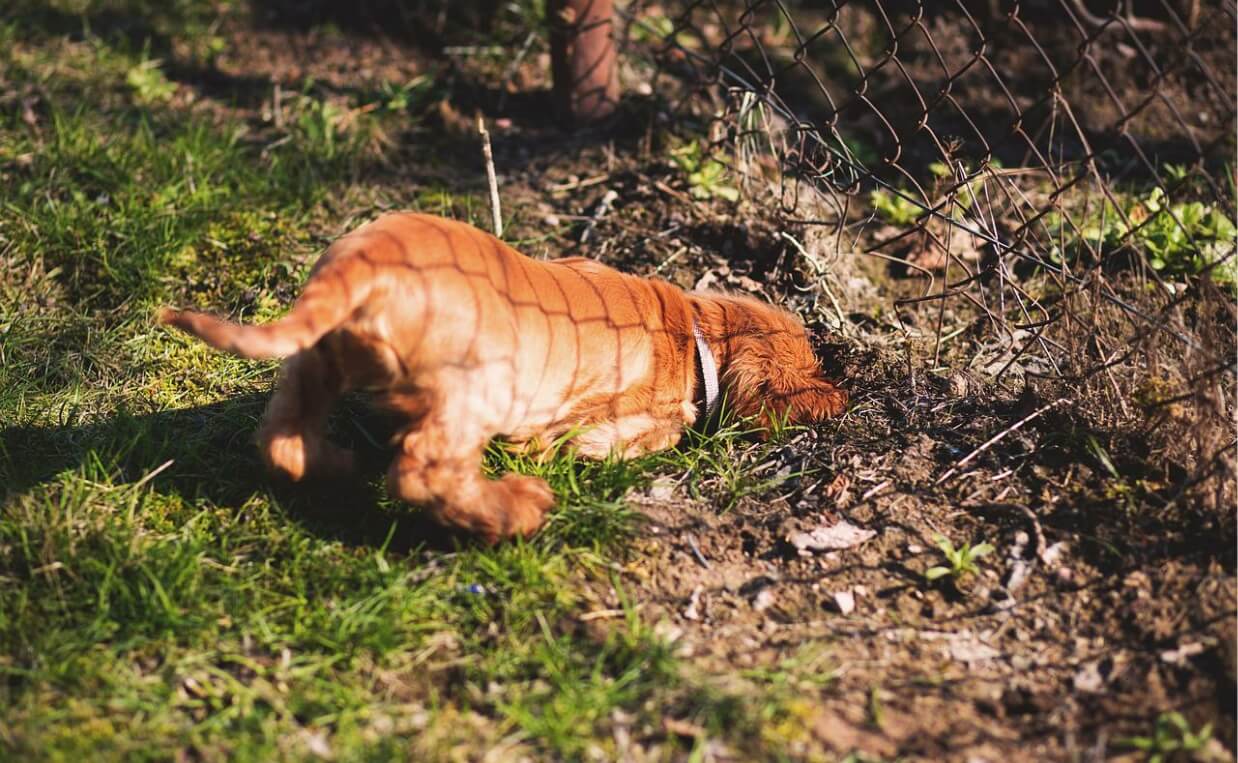
-
Your dog is guarding
If your dog perceives there is a threat to your property (which he or she considers their territory), he or she may be trying to challenge and eliminate the threat. This trait is particularly strong in guardian breeds, such as German Shepherds, Dobermans, Rottweilers, Bull Mastiffs, Australian Shepherds, etc.
-
Your dog is lonely
Dogs are highly social animals. If a dog is left alone for a long period of time, he or she will seek companionship. Your dog may be seeking you, members of your family or other dogs to be with.
-
Your dog is seeking a mate
Sexual roaming is common in dogs who are not neutered, especially males. Mating urges can sometimes override your dog’s desire to stay inside the confines of your backyard.
-
Your dog is stressed
A stressed or anxious dog may try to escape a yard simply because he or she is confined. Your dog could be experiencing separation anxiety or spooked by a scary stimulus like a thunderstorm or fireworks.
-
Your dog is trying to escape the heat or cold
In summer, it’s common for dogs to dig to find a cool patch to sit in. Make sure your dog has other alternatives to keep cool. Ensure there are shaded areas throughout the day. Dogs don’t sweat like humans so the use other methods to keep themselves cool. Conversely, dogs also dig holes in cold weather to stay warm.
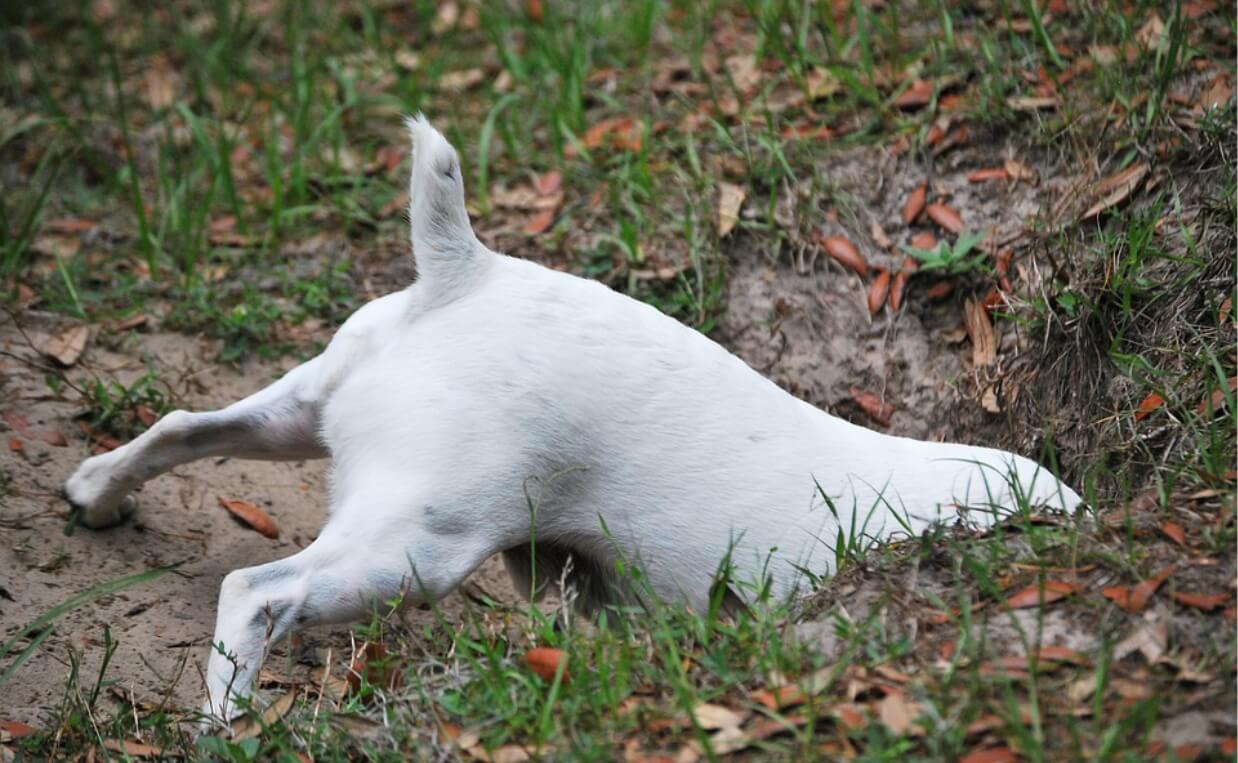
-
Pregnant dogs are digging a place to give birth
A pregnant dog will dig a hole, called denning, in order to create a safe place where she can give birth to her pups. She may dig lots of holes as a nesting instinct.
Solutions for Dogs Who Dig Under Fences
Keep in mind the following solutions may not fix the problem right away. Often, you need to work with your dog to train them to respect a new physical barrier so he or she doesn’t hurt themselves.
Some of the following methods may take some time to implement but are worth investing in to keep your dog safe.
Solution #1. Fill in any existing holes
Your dog may find an existing hole irresistible, so keep new holes filled. If there are any regular “problem areas” it might make sense to cover up the area with landscaping or other lawn fixtures.

Solution #2. Bury the bottom portion of the fence
If your dog tends to dig under your fence, try burying the bottom portion of the panels in the ground. This is essential for building dog-proof fencing for an escape artist. Bury the fence at least one to two foot below the surface to ensure that your dog doesn’t dig under and get out.
If your fence is a chain link fence, consider burying large rocks at the base of the fence as an additional deterrent.
Solution #3. Attach wire to the bottom of the fence
Burying or attaching some chicken wire to the bottom of your fence can create a barrier difficult for your dog to dig through. You can also anchor a small strip of plastic fencing to the bottom of any DIY dog fence making it difficult for your dog to dig out.
Solution #4. Pile gravel at the base of the fence
Dogs can’t dig through a layer of large rocks, so consider piling a layer of large gravel near the base of your fence. This is an easy solution, especially for privacy fences which can be challenging to modify with wire.
Solution #5. Pour concrete at the base of your fence
Dogs can’t dig through concrete, so this extra layer of protection is a surefire way to prevent your dog from escaping. Even though it is effective, it will change the aesthetic of the area and can be a costly option.
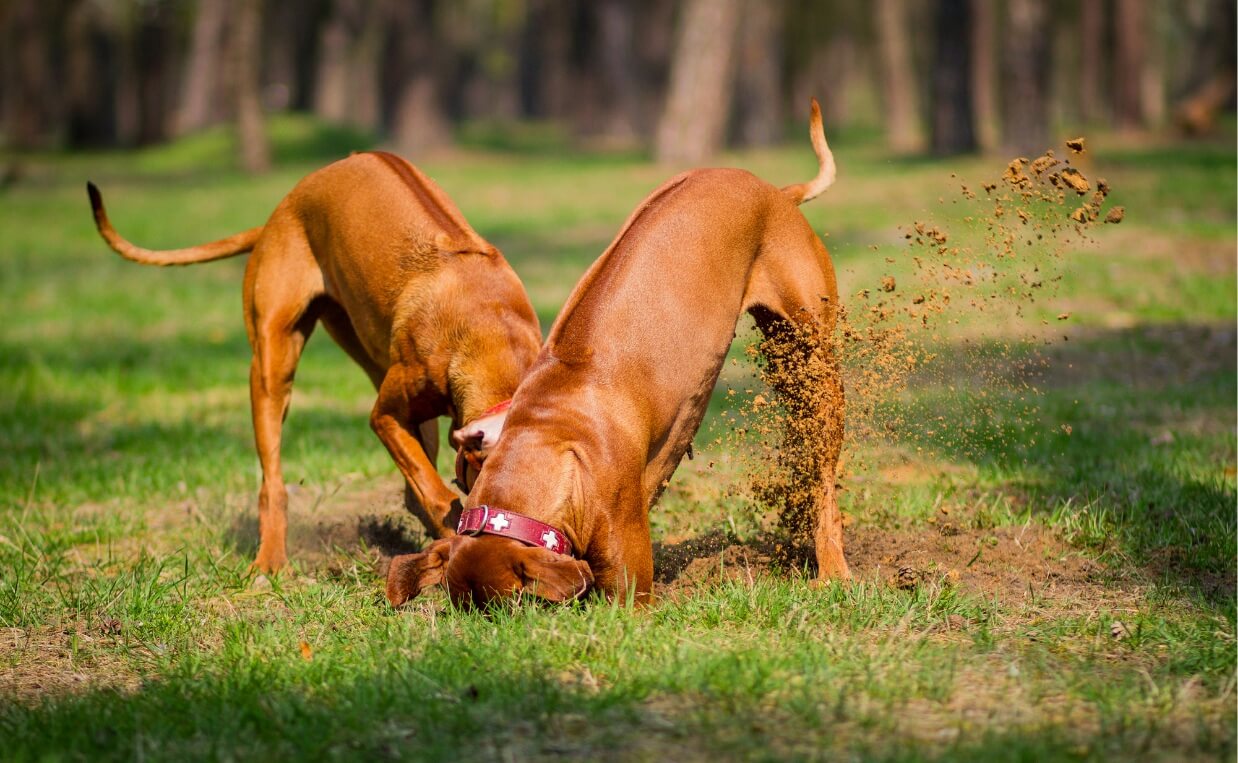
Solution #6. Dog safe digging deterrents
Using a dog-safe deterrent spray may help prevent your dog from coming near your fence. Keep in mind these products can stain your fence so, if you’re concerned about the look of your fence, try diluted vinegar instead. It’s not effective with all dogs, but it might be worth a chance since it is very inexpensive.
Solution #7. Give your furry friend a place where he or she can dig
If your dog is digging out of instinct, he or she may just need to dig. Sometimes, providing your dog a place to dig and redirecting him or her to that area can be an effective solution. Digging can be a rewarding enrichment activity, and many owners have successfully given their dog a place to dig (and lay in sand or dirt) rather than halting it completely.
Please note: it may take some time and effort on your part to redirect your dog to the approved digging place before he or she understands.
Solution #8. Neuter (or spay) your dog
If your dog is seeking a mate, it’s a good idea to get him or her neutered. There are several benefits to having your dog neutered, one of which is it may reduce your dog’s urges to engage in sexual roaming behaviors.
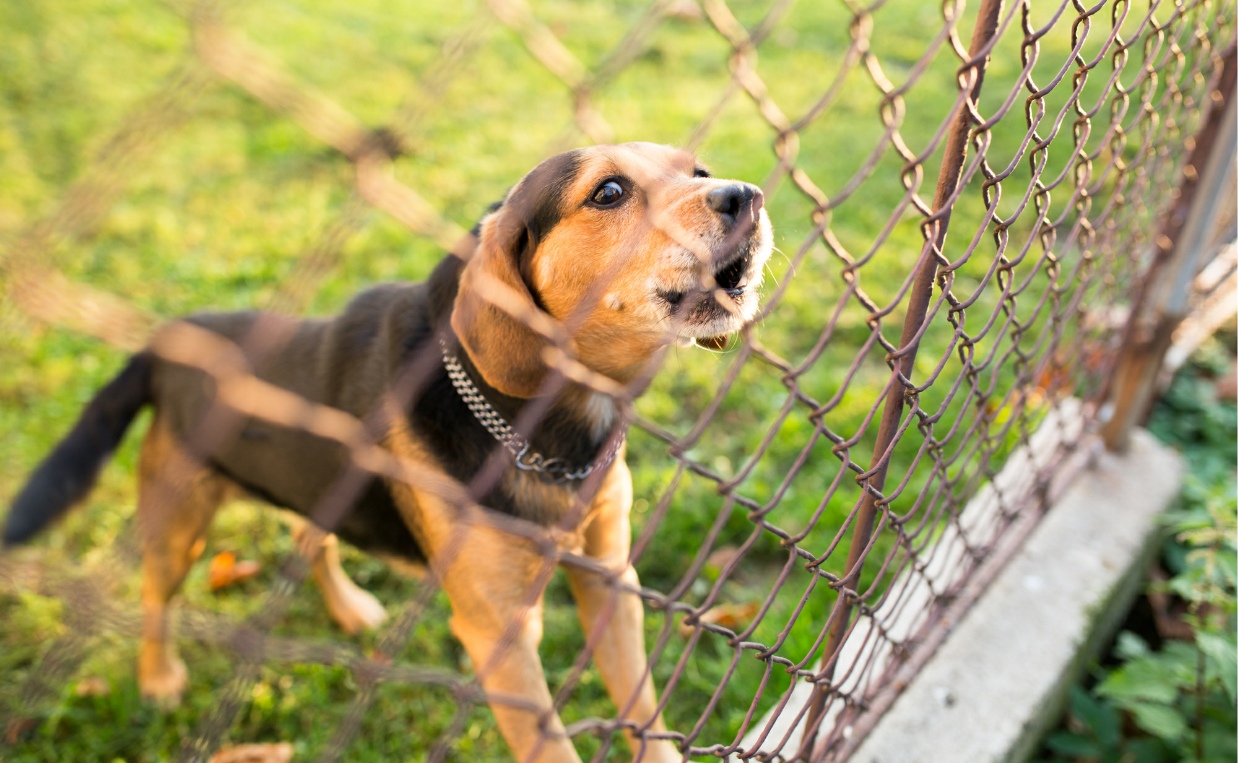
Solution #9. Provide more physical exercise
If your dog has pent up energy, he or she may need more physical exercise. Consider:
- Take him or her on regular walks or runs
- Go hiking with your dog
- Engage in sports or agility training with your dog
- Spend more time playing with your dog
- Take your dog to daycare
Solution #10. Eliminate your dog’s line-of-sight beyond the fence
If your dog is digging in pursuit of prey, it may be a good idea to look into a privacy fence. If you have a chain link fence, it will keep your dog in your yard, but unfortunately, your dog can still see what’s happening on the other side, which can drive your dog nuts if he or she has a prey instinct.
The best way to address this is to build a solid fence and maybe use strategic landscaping.
Solution #11. Make sure your dog is comfortable
If your dog is digging to try to get to a cooler spot in the summer or warmer place in the winter, or is pregnant and trying to build a den, provide your dog with a comfortable dog house. There are lots of ideas and DIY plans for building a dog house on Pinterest and you can buy plans on Etsy.
If your dog is cold, consider a heated dog bed in the dog house. Of course, if it’s too cold for you, it’s too cold for them to be left outside, especially in Colorado, where temperatures can drop rather quickly.
If your dog is pregnant and trying to dig a den, find or make her a suitable whelping box.
Solution #12. Add some landscaping features
Another solution to consider is adding some landscaping features like rocks, trees, shrubs and gravel. These elements will deter your dog from the areas where you don’t want him or her to dig.

Solution #13. Supervise your dog
Some dogs need to be supervised when they are outside, especially puppies and young dogs. Until you’re certain your dog is ready to be unsupervised while outside for short periods of time, it is best you stay with him or her to help redirect them and engage with them.
Solution #14. Bring your dog to daycare
Daycare offers so many benefits to dogs, including socialization, exercise, stimulation and building trust with other dogs and people. At daycare, your dog will be supervised, given affection and care. Bring your dog to daycare so he or she is not left alone for long periods of time.
What NOT to Do When Trying to Stop Canine Digging Behaviors
-
Don’t punish your dog after the digging has already occurred
Unless you actually catch your dog digging, it isn’t productive to scold or punish your dog after the digging occurred. Your dog will just be confused and won’t understand what you’re so upset about.
If you catch your dog digging, it is a perfect time to redirect him or her to an acceptable digging area or another activity.
-
Don’t leave your dog tied up and unsupervised
Dog tie ups and tethers are not safe to use unless you’re with your dog and supervising him and her. They can be used as a replacement of a long leash while you’re outside with your dog, but not when your dog is alone.
-
Don’t fill the hole with water
Water won’t permanently fill the hole your dog has dug and might even encourage your dog to play in it if he or she enjoys splashing or swimming. Take the time to fill the holes to match the rest of your landscaping.
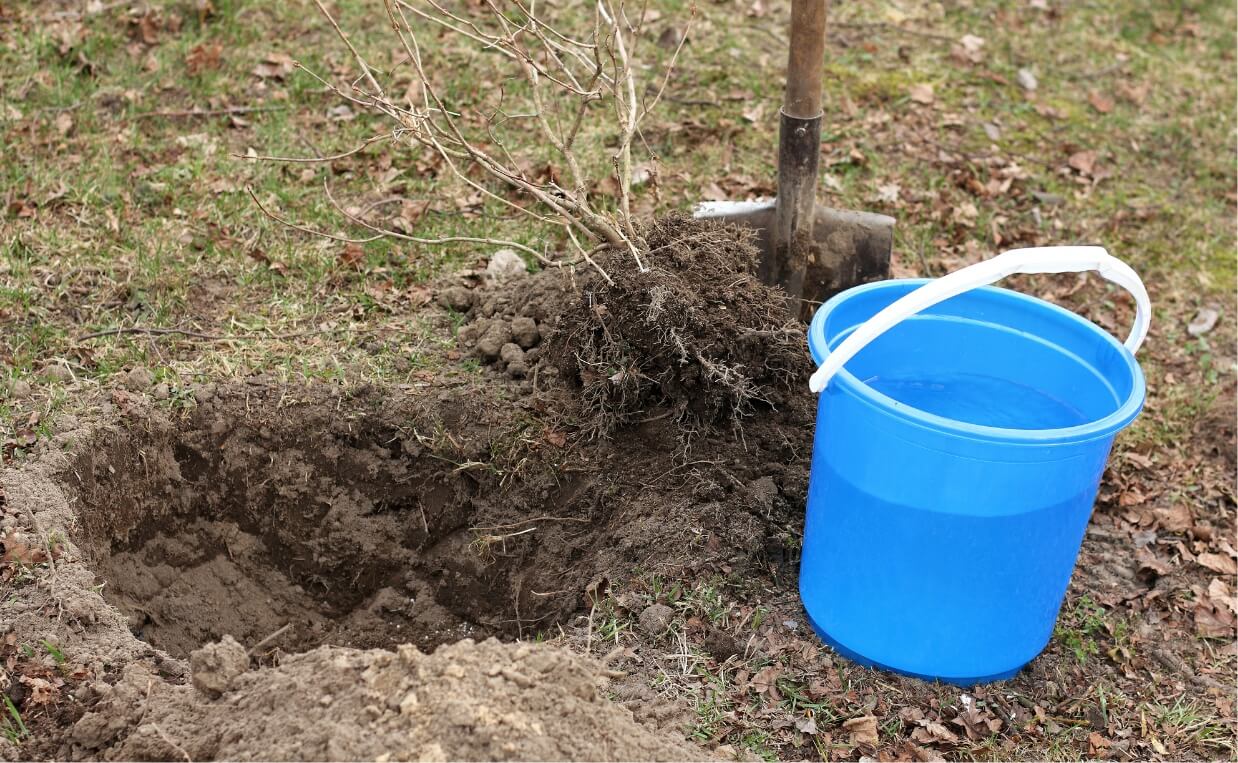
-
Don’t use anything that will hurt your dog
Don’t use aggressive chemical repellents or poisons to try to repel the digging because they may harm your dog. Also, stay away from sharp objects or hard obstructions because they could injure your dog.
Dealing with a dog who loves to dig can be extremely frustrating. However, with creative solutions and training, you’ll be able to keep your dog safe while he or she spends time in your yard.
Does your dog like to dig? Have any of the above solutions helped you? Is there another solution you think should be added to this list? Please share your experience with the Canine Campus community by commenting below…

 How Service Dogs Reduce PTSD Symptoms: Unleashing the Healing Bond
How Service Dogs Reduce PTSD Symptoms: Unleashing the Healing Bond 5 Ways Dogs Show Gratitude
5 Ways Dogs Show Gratitude Why Do Dogs Chase Their Tails?
Why Do Dogs Chase Their Tails? Do Dogs Like Music?
Do Dogs Like Music? Beyond the Litter: Do Puppies Remember Their Siblings?
Beyond the Litter: Do Puppies Remember Their Siblings?






I used Dig defence from Digdefence.com. it is the only solution for diggers that actually works. Get the XL version and your digging issues will be eliminated. I am just a regular Joe and not affiliated with the company whatsoever, only found the product after searching for a solution to groundhogs digging under my fence for years and eroding my foundation. Trust me, it works. Much easier and cheaper than concrete and peace of mind is priceless when not wanting your dog to get out or pests to get in.
Thanks for sharing your tip with the Canine Campus dog lover community! Great tip! Much appreciated!